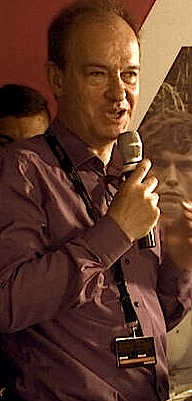Peter Bradshaw
This article needs additional citations for verification. (June 2016) |
Peter Bradshaw | |
|---|---|
 Peter Bradshaw speaking at the 2013 Cannes Film Festival | |
| Born | Peter Nicholas Bradshaw 19 June 1962[1] |
| Nationality | British |
| Education | Haberdashers' Aske's Boys' School |
| Alma mater | University of Cambridge (BA, PhD) |
| Occupation | Author film critic |
| Employer | The Guardian Evening Standard[1] |
| Spouse(s) | Caroline S. Hill |
| Website | theguardian |
Peter Bradshaw (born 19 June 1962) is an English writer and film critic. He has been chief film critic at The Guardian since 1999, and is a contributing editor at Esquire.[1]
Early life and education[]
Bradshaw was educated at Haberdashers' Aske's Boys' School in Hertfordshire,[2] and studied English at Pembroke College, Cambridge, where he was president of the Cambridge Footlights. He was awarded a Bachelor of Arts degree in 1984,[1] followed by postgraduate research in the Early Modern period in which he studied with Lisa Jardine and Anne Barton. He received his PhD in 1989.[3]
Career[]
In the 1990s Bradshaw was employed by the Evening Standard as a columnist, and during the 1997 general election campaign, editor Max Hastings asked him to write a series of parodic diary entries purporting to be written by the Conservative MP and historian Alan Clark, which Clark thought deceptive and which were the subject of a court case resolved in January 1998, the first in newspaper history in which the subject of a satire sued its author. Bradshaw was not put into the witness box by his QC Peter Prescott, and the judge Gavin Lightman found in Clark's favour, granting an injunction, deciding that Bradshaw's articles were then being published in a form that "a substantial number of readers" would believe they were genuinely being written by Alan Clark.[4] Bradshaw found it "the most bizarre and surreal business of my professional life. I'm very flattered that Mr Clark should go to all this trouble and expense in suing me like this."[5]
Since 1999, Bradshaw has been chief film critic for The Guardian, writing a weekly review column every Friday for the paper's Film&Music section. In a 2012 Sight & Sound poll of cinema's greatest films, Bradshaw indicated his ten favourites, given alphabetically, are The Addiction (1994), Andrei Rublev (1966), Annie Hall (1977), Black Narcissus (1947), Hidden (2005), I am Cuba (1964), In the Mood for Love (2000), Kind Hearts and Coronets (1949), Raging Bull (1980) and Singin' in the Rain (1952).[6]
Bradshaw is a regular guest reviewer on the Film... programme broadcast on BBC One.[7]
Other work[]
A selection of his reviews, entitled The Films That Made Me..., was brought out by Bloomsbury Publishing in September 2019.[citation needed]
Bradshaw has written three novels, Lucky Baby Jesus, published in 1999, Dr Sweet and his Daughter, published in 2003 and Night Of Triumph, published in 2013.[citation needed]
He wrote and performed a BBC Radio 4 programme entitled For One Horrible Moment, recorded 10 October 1998 and first broadcast 20 January 1999, which chronicled a young man's coming of age in 1970s Cambridgeshire. His bittersweet short story Reunion, first broadcast on BBC Radio 4 on 21 October 2016, was narrated by Tom Hollander and described as "sad and sly, and connected impermeably to the mid-Seventies and what it felt like to be young".[8] Another short story by Bradshaw, entitled Neighbours Of Zero, first broadcast on Radio 4 on 17 November 2017, was narrated by Daniel Mays.[9] Bradshaw's story, entitled Senior Moment, first broadcast on Radio 4 on 22 May 2020, was narrated by Michael Maloney.[10] He co-wrote and acted in David Baddiel's sitcom Baddiel's Syndrome, first aired on Sky One.[11]
Awards[]
He has been shortlisted four times at the British Press Awards in the Critic of the Year category, in 2001, 2007, 2013 and 2014, gaining "Highly Commended" on this last occasion.[12]
References[]
- ^ Jump up to: a b c d Anon (2012). "Bradshaw, Peter Nicholas". Who's Who. ukwhoswho.com (online Oxford University Press ed.). A & C Black, an imprint of Bloomsbury Publishing plc. doi:10.1093/ww/9780199540884.013.8497. (subscription or UK public library membership required) (subscription required)
- ^ Bradshaw, Peter (9 September 2008). "Sex, violence and classroom action: Peter Bradshaw on the best school movies". The Guardian. ISSN 0261-3077. Retrieved 2 July 2020.
- ^ Bradshaw, Peter Nicholas (1989). The idea of anatomy in the work of seventeenth-century prose writers (PhD thesis). University of Cambridge. OCLC 53500534. EThOS uk.bl.ethos.315770.
- ^ Kate O'Hanlon "Law report: Format of parodied Clark diaries was deceptive", The Independent, 28 January 1998
- ^ "Clark victorious in diary battle", BBC News, 21 January 1998
- ^ "Peter Bradshaw BFI's 2012 Sight & Sound Poll". BFI. Archived from the original on 22 December 2015.
- ^ Peter Bradshaw at IMDb
- ^ Quirke, Antonia. "The pleasure of being young, captured for radio". New Statesman. Retrieved 27 October 2016.
- ^ Bradshaw, Peter. "Neighbours Of Zero". BBC. Retrieved 17 November 2017.
- ^ Bradshaw, Peter. "Senior Moment". BBC. Retrieved 22 May 2020.
- ^ Leith, William; Flett, Kathryn (31 December 2000). "Analyse This". The Guardian. Retrieved 2 July 2020.
- ^ "The Press Awards — list of winners", The Guardian, 2 April 2014
- Alumni of Pembroke College, Cambridge
- People educated at Haberdashers' Aske's Boys' School
- English male journalists
- English male non-fiction writers
- English film critics
- The Guardian journalists
- Living people
- 1962 births